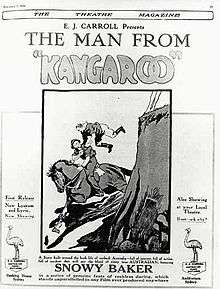The Man from Kangaroo
| The Man from Kangaroo | |
|---|---|
 Theatrical release poster | |
| Directed by | Wilfred Lucas |
| Produced by |
E. J. Carroll Snowy Baker |
| Written by | Bess Meredyth |
| Starring | Snowy Baker |
| Cinematography | Robert V. Doerrer |
Production company |
Carroll-Baker Australian Productions |
Release dates | 24 January 1920 (Sydney) |
Running time | 6 reels |
| Country | Australia |
| Language |
Silent film English intertitles |
The Man from Kangaroo is a 1920 Australian silent film starring renowned Australian sportsman Snowy Baker. It was the first of several films he made with the husband and wife team of director Wilfred Lucas and writer Bess Meredyth, both of whom had been imported from Hollywood by E. J. Carroll.[1][2]
Synopsis
John Harland is a former boxer turned reverend posted to the town of Kangaroo. He falls in love with Muriel, an orphaned heiress, and discovers that her guardian Martin Giles is embezzling her inheritance. Harland earns the ire of parishioners by teaching young boys to box, and Giles manipulates local opinion to have the bishop remove him.
Harland rescues a gentleman from a mugging in Sydney who suggests that he go to Kalmaroo where a criminal gang has driven the church out of the area. Harland preaches, and unexpectedly sees Muriel in the congregation; her property is near Kalmaroo.
But her overseer is Red Jack Braggan who leads the gang which violently breaks up Harland's mission – much to the distress of Muriel who regards Harland as too timid – and is in cahoots with Giles. Harland goes to work as a station hand at a property neighbouring Muriel's.
Giles arranges for Red Jack to kidnap Muriel so that he might marry the girl and thus prevent her giving evidence against him. Harland rescues Muriel: they leap from the stage coach as it thunders across Hampden Bridge into the Kangaroo River.
Cast
- Snowy Baker as John Harland
- Charles Villiers as Martin Giles
- Agnes Vernon as Muriel Hammond
- Walter Vincent as Ezra Peters
- Wilfred Lucas as Black Jack Braggan
- Malcolm MacKellar (foreman)
Production
Baker visited Hollywood in 1918 to shoot additional scenes for The Lure of the Bush and to study production methods. With E. J. Carroll he arranged to bring back a team of Americans to assist them making movies in Australia, including director Wilfred Lucas, his wife, screenwriter Bess Meredyth, actor Brownie Vernon, assistant director John Wells and cinematographer John Doerrer.
Meredyth spent a few months in the Mitchell Library in Sydney looking for topics to make movies about. It was later stated at the Royal Commission on the Moving Picture Industry in Australia that Meredyth felt "the only truly national subject about which producers could make a picture [in Australia] was horse racing. Australians, she said, had not yet developed any distinctive individuality of national character or tradition." This is what prompted the Carrolls to make all their films with Lucas and Baker about bush and station life.[3]
The film was shot on location in Kangaroo Valley and Gunnedah, with interiors at the Theatre Royal in Sydney during September and October 1919.[4]
Carroll-Baker Productions was formed in 1919 with a capital of ₤25,000 between E. J. Carroll, his brother Dan, Snowy Baker and the Southern Cross Feature Film Company. Said Dan Carroll at the time:
It Is not our intention to make any one subject which will not be of such a standard that it cannot be market ed in every English-speaking country in the world. With this ambition in view we are proud enough to think that we are being of national service to our own beloved Australia.[5]
They bought a house, "Palmerston" in the Sydney suburb at Waverley and converted it into a studio.[6] They ultimately made only two more films, The Shadow of Lightning Ridge (1920) and The Jackeroo of Coolabong (1920).
Reception
The film was a success at the box office.[7]
References
- ↑ "MOTION PICTURES." The Sydney Morning Herald 3 Sep 1919: 11 accessed 18 December 2011
- ↑ Paul Kalina, "The Man from Kangaroo", Cinema Papers, June 1997 p16-17
- ↑ "THE NATIONAL IDEAL." The Register (Adelaide) 22 Nov 1927: 13 accessed 18 December 2011
- ↑ "THE MAN FROM KANGAROO.". The Register (Adelaide) 26 Apr 1920: 9 accessed 18 December 2011
- ↑ "STAGE ASIDES." Townsville Daily Bulletin 14 Nov 1933: 7 accessed 18 Dec 2011
- ↑ "AUSTRALIAN FILM MAKERS.". The Barrier Miner (Broken Hill, NSW: National Library of Australia). 9 June 1920. p. 4. Retrieved 26 July 2012.
- ↑ "AUSTRALIAN FILMS." The Sydney Morning Herald 22 Nov 1927: 12 accessed 18 December 2011
External links
- The Man from Kangaroo at the Internet Movie Database
- The Man from Kangaroo at the National Film and Sound Archive